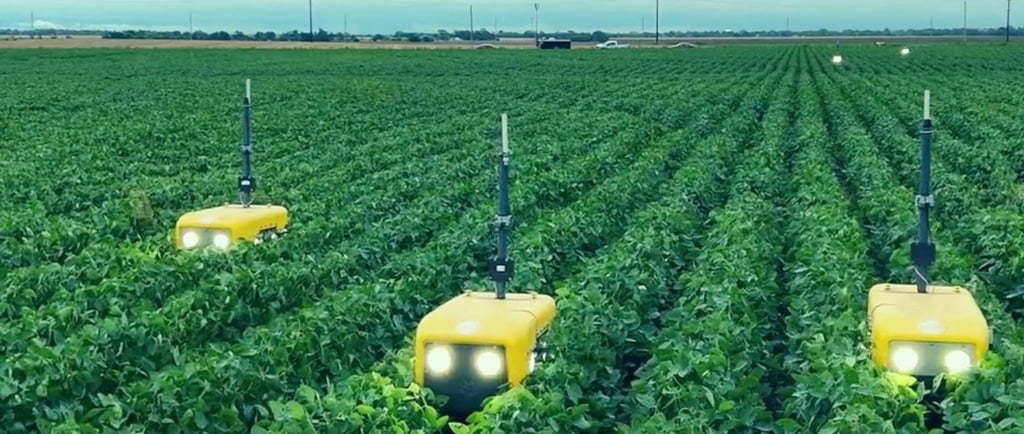Weed Control Robots: A Sustainable Solution
Weeds have long been the unseen enemy of Indian farmers—competing with crops for water, nutrients, and sunlight. In the traditional fight against weeds, chemical herbicides and manual labor have been the primary tools. But both come at a cost: environmental degradation, increased input expenses, and rising labor scarcity. Enter weed control robots—an innovative, AI-powered solution that offers precision, sustainability, and efficiency.
HawkEye
5/12/20252 min read


The Weed Challenge in Indian Farming
India's climate and cropping patterns make fields especially vulnerable to weed infestation. Farmers often apply broad-spectrum herbicides, which not only harm the soil microbiome but also raise long-term costs and reduce productivity.
In regions such as Uttar Pradesh, Odisha, and Tamil Nadu—where paddy, sugarcane, and vegetables dominate—weed management consumes up to 25–30% of cultivation costs. Labor shortages and manual inefficiency only add to the burden.
There’s an urgent need for smart, targeted, and eco-friendly weed control. This is where robotic weeding systems, backed by AI platforms like KrishiGyan AI, are making a measurable difference.
How Weed Control Robots Work
Computer Vision & AI Detection
These robots use cameras and AI algorithms to distinguish between crop plants and weeds—often with 98%+ accuracy. They scan rows in real-time and make split-second decisions.
Mechanical or Micro-Dose Action
Once weeds are identified, the robot either:
Mechanically removes them (via blades or rotating tools), or
Applies micro-doses of herbicide directly to the weed, drastically cutting chemical use.
Data Collection & Mapping
The robots collect spatial data on weed density and infestation zones, which is sent to platforms AI to analyze patterns and optimize future planning.
AI: Catalyzing Smart Weed Management
AI plays a critical role in enabling farmers to adopt robotic weed control in an informed and accessible way:
🌿 Customized Weed Profiles: AI trained on Indian weed species for rice, wheat, pulses, and horticulture crops.
📱 Multi-language Support: Advisory, alerts, and training content in Hindi, Marathi, Tamil, Telugu, and more.
🤝 Vendor Access: Connects farmers with reliable robotic weeding solutions suited for small and medium farm holdings.
🧑🏫 Training & Deployment Support: Digital and field workshops to train SHGs, cooperatives, and FPOs in robot operation.
💰 Smart Financing Help: Support in accessing government subsidies under SMAM and agri-startup schemes.
Real Impact in the Field
In Karnataka, precision weeders supported by KrishiGyan AI helped reduce herbicide usage by 60%, protecting nearby water bodies.
In Madhya Pradesh, soybean farmers cut weeding labor costs by 40% using mechanical weed robots in pilot trials.
In Assam, tribal farming collectives using AI guidance successfully mapped weed-prone zones to plan targeted interventions with drones and ground robots.
Why This Matters
Weed control robots are not just about replacing labor—they’re about increasing sustainability, reducing input dependency, and restoring soil health. For a country like India, where agriculture must balance productivity with ecological care, these robots are game changers.
And with KrishiGyan AI providing end-to-end digital support, even smallholder farmers can benefit from the precision and intelligence of these technologies.
The Road Ahead
As we move towards a climate-resilient and tech-enabled future, robotic weed control will become a core part of India's smart farming toolkit. With costs expected to decrease and performance increasing, adoption will accelerate—especially through government-backed initiatives and FPO-driven models.
Platforms like KrishiGyan AI will be essential—not just in deploying the tech, but in ensuring farmer literacy, affordability, and scalability across the country.
Conclusion
In the battle against weeds, robots are no longer a luxury—they’re a necessity. With AI-driven systems, Indian farmers can achieve better yields, lower costs, and a cleaner environment. Through its grassroots training, tech partnerships, and intelligent advisory systems, KrishiGyan AI is sowing the seeds of a greener, smarter, and more sustainable future for Indian agriculture.
